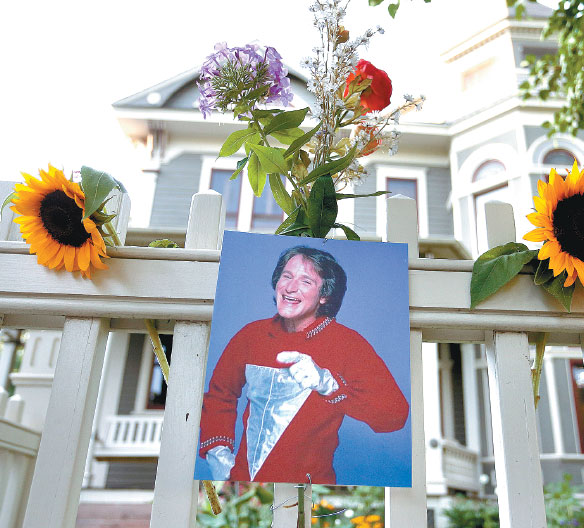A life dedicated to entertaining others
Oscar-winning actor Robin Williams remembered for variety of roles
Robin Williams, a brilliant shape-shifter who could channel his frenetic energy into delightful comic characters like Mrs. Doubtfire or harness it into richly nuanced work like his Oscar-winning turn in Good Will Hunting, died on Monday in an apparent suicide. He was 63.
Williams was pronounced dead at his San Francisco Bay Area home on Monday, according to the Sheriff's Office in Marin County, north of San Francisco. The office said the preliminary investigation shows the cause of death to be a suicide due to asphyxia.
|
A photo of the late actor Robin Williams as Mork hangs with flowers left by people paying their respects, in Boulder, Colorado, on Monday at the home where his hit TV series Mork & Mindy was set. AP |
The Marin County Coroner's Office said Williams was last seen alive at home at about 10 pm on Sunday. An emergency call from his house in Tiburon was placed to the Sheriff's Office shortly before noon on Monday.
"This morning, I lost my husband and my best friend, while the world lost one of its most beloved artists and beautiful human beings. I am utterly heartbroken," said Williams' wife, Susan Schneider.
"On behalf of Robin's family, we are asking for privacy during our time of profound grief. As he is remembered, it is our hope the focus will not be on Robin's death, but on the countless moments of joy and laughter he gave to millions."
Williams had been battling severe depression recently, said Mara Buxbaum, his press representative. Just last month, he announced he was returning to a 12-step treatment program he said he needed after 18 months of nonstop work. He had sought treatment in 2006 after a relapse following 20 years of sobriety.
From his breakthrough in the late 1970s as the alien in the hit TV comedy Mork & Mindy, through his stand-up comedy act and such films as Good Morning, Vietnam, the short, barrel-chested Williams ranted and shouted as if just sprung from solitary confinement. Loud, fast and manic, he parodied personalities as diverse as actor John Wayne and rock musician Keith Richards, impersonating a Russian immigrant as easily as a pack of Nazi attack dogs.
He was a riot in drag in Mrs. Doubtfire, or as a cartoon genie in Aladdin. He won his Academy Award in a rare dramatic role, as an empathetic therapist in the 1997 film Good Will Hunting.
Like so many funnymen, Williams had dramatic ambitions. He played for tears in Awakenings, Dead Poets Society and What Dreams May Come, which led New York Times critic Stephen Holden to write that he dreaded seeing the actor's "Humpty Dumpty grin and crinkly moist eyes."
But other critics approved, and Williams won three Golden Globes, for Good Morning, Vietnam, Mrs. Doubtfire and The Fisher King.
His other film credits included Robert Altman's Popeye (a box office bomb), Paul Mazursky's Moscow on the Hudson, Steven Spielberg's Hook and Woody Allen's Deconstructing Harry. On stage, Williams joined fellow comedian Steve Martin in a 1988 Broadway revival of Waiting for Godot.
"Robin was a lightning storm of comic genius and our laughter was the thunder that sustained him. He was a pal and I can't believe he's gone," Spielberg said.
More recently, Williams appeared in the Night at the Museum movies, playing US President Theodore Roosevelt in the comedies in which Ben Stiller's security guard has to contend with wax figures that come alive and wreak havoc after a museum closes. The third film in the series is in postproduction, according to the Internet Movie Database.
In April, Fox 2000 said it was developing a sequel to Mrs. Doubtfire, and Williams was in talks to join the production.
Williams also made a short-lived return to TV last fall in CBS' The Crazy Ones, a comedy about a father-daughter ad agency team that co-starred Sarah Michelle Gellar. It was canceled after one season.
"I dread the word 'art,'" Williams said in 1989 when discussing his craft with the AP. "That's what we used to do every night before we'd go on with Waiting for Godot. We'd go, 'No art. Art dies tonight.' We'd try to give it a life, instead of making Godot so serious. It's cosmic vaudeville staged by the Marquis de Sade."
(China Daily 08/13/2014 page10)









